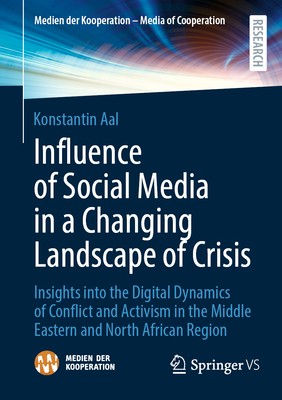
- We will send in 10–14 business days.
- Author: Konstantin Aal
- Publisher: Springer vs
- ISBN-10: 3658455160
- ISBN-13: 9783658455163
- Format: 14.8 x 21 x 1.7 cm, minkšti viršeliai
- Language: English
- SAVE -10% with code: EXTRA
Influence of Social Media in a Changing Landscape of Crisis (e-book) (used book) | bookbook.eu
Reviews
Description
Social media and information and communication technologies (ICTs) have played a pivotal role in various conflicts around the world, including the Arab Spring in Tunisia, the war in Syria, Palestinian activism, and the recent protests in Iran. This book examines the use and impact of ICT and social media in these conflicts, focusing on countries in the MENA region. The research takes an on-the-ground approach, working closely with local people to understand their everyday use and appropriation of social media and ICT. The author presents four studies covering different aspects of social media use in conflict: the evolution of the media landscape in post-uprising Tunisia; Palestinian activists using social media to oppose the construction of the wall; the role of social media among Syrian Free Army fighters, activists and refugees; and young Iranians' strategies for circumventing internet restrictions. These studies reveal the ways in which social media and conflict intersect. The research assesses the impact of social media in these settings, considering the historical, socio-economic and socio-technical dynamics of the regions. Finally, the dissertation critically reflects on the methods used in this fieldwork, emphasizing the role of the researcher and personal biases.
EXTRA 10 % discount with code: EXTRA
The promotion ends in 23d.05:03:02
The discount code is valid when purchasing from 10 €. Discounts do not stack.
- Author: Konstantin Aal
- Publisher: Springer vs
- ISBN-10: 3658455160
- ISBN-13: 9783658455163
- Format: 14.8 x 21 x 1.7 cm, minkšti viršeliai
- Language: English English
Social media and information and communication technologies (ICTs) have played a pivotal role in various conflicts around the world, including the Arab Spring in Tunisia, the war in Syria, Palestinian activism, and the recent protests in Iran. This book examines the use and impact of ICT and social media in these conflicts, focusing on countries in the MENA region. The research takes an on-the-ground approach, working closely with local people to understand their everyday use and appropriation of social media and ICT. The author presents four studies covering different aspects of social media use in conflict: the evolution of the media landscape in post-uprising Tunisia; Palestinian activists using social media to oppose the construction of the wall; the role of social media among Syrian Free Army fighters, activists and refugees; and young Iranians' strategies for circumventing internet restrictions. These studies reveal the ways in which social media and conflict intersect. The research assesses the impact of social media in these settings, considering the historical, socio-economic and socio-technical dynamics of the regions. Finally, the dissertation critically reflects on the methods used in this fieldwork, emphasizing the role of the researcher and personal biases.


Reviews